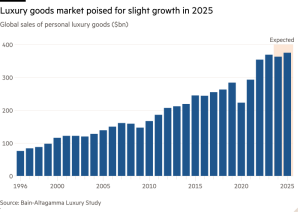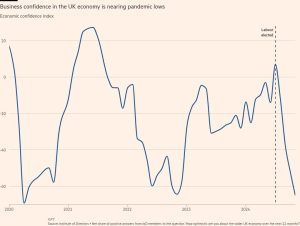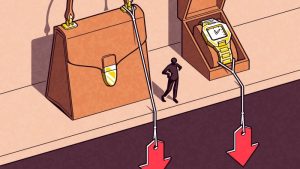Chad ends defence pact with France
Unlock the Editor’s Digest for free
Roula Khalaf, Editor of the FT, selects her favourite stories in this weekly newsletter.
Chad is ending a defence co-operation agreement with France that could force the withdrawal of 1,000 French soldiers from the country, marking the latest blow to President Emmanuel Macron’s disintegrating strategy to reset ties with Africa.
The central African country’s foreign ministry said it was ending a treaty that was last revised in 2019 as part of plans to assert Chad’s “full sovereignty, and to redefine its strategic partnerships according to national priorities” after more than six decades of independence from its former colonial power.
Chad is a longtime western partner, which under the leadership of former leader Idriss Déby Itno became a bulwark in the war against Islamist insurgents in the Sahel, the vast desert region south of the Sahara.
Déby died on the frontline three years ago and was replaced by his son Mahamat Idriss Déby Itno in an unconstitutional transfer of power. The younger Déby, who won a controversial May election to legitimise his authority, has aimed to diversify his country’s strategic partnerships. The 40-year-old army general’s hold on power is largely seen as weak by a fractious military and many within his own ethnic group doubt his ability to lead.
Chad’s move to cut military ties is a further repudiation of France in its former colonial sphere of influence. Military leaders who seized power in Burkina Faso, Mali and Niger on the back of widespread discontent over insecurity, poverty and France’s influence have kicked out European troops. All have turned to Russia in varying degrees, with Niger and Mali employing mercenaries from the Wagner Group, the former private military company now under the control of Russia’s defence ministry.
France’s foreign ministry did not immediately return a request for comment.
Will Brown, senior policy fellow with the Africa programme at the European Council on Foreign Relations, said the move should also be seen in the context of Macron’s drive to withdraw troops from the region.
“What is the sense of having about 1,000 troops in Chad meant in large part to fight insecurity in the central Sahelian states of Niger, Mali and Burkina Faso, if you’re on appalling terms with those three governments?” he said.
He added that Déby could be “claiming ownership of events which are largely outside his control. In doing so, he defangs his domestic opposition who say he’s in the pocket of France.”
Déby has forged alliances with the United Arab Emirates and Russia and a burgeoning friendship with Hungarian Prime Minister Viktor Orbán. In the past year, Hungary has announced plans to establish a diplomatic mission in the capital N’Djamena and deploy Hungarian troops to fight insurgent groups with a promise of $200mn in aid.
The UAE has provided Chad with aid and military equipment and opened two field hospitals in the country. Diplomats and western security officials have alleged that at least one of the field hospitals is being used to arm the Rapid Support Forces, a Sudanese paramilitary group that has been fighting the country’s recognised armed forces in a devastating civil war that broke out 19 months ago. The UAE has repeatedly denied supplying weapons to the RSF.
Déby’s announcement was followed by comments by Senegalese President Bassirou Diomaye Faye demanding the departure of about 350 French soldiers based in the west African country.
“Why would there be a need for French soldiers in Senegal? What country can have foreign soldiers on its soil and claim its independence?” Faye told French newspaper Le Monde in an interview. He did not give a timeline for their departure.
Faye, who said Dakar had excellent relations with Paris, added: “We have co-operation with the US, China and Turkey without these countries having a base on our soil. Is France capable of doing this?”
#Chad #ends #defence #pact #France






